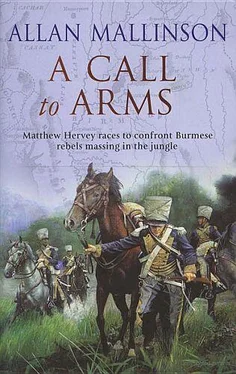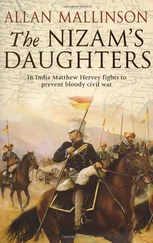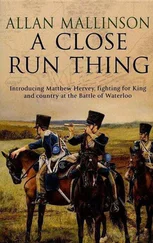One of the things that contrived to diminish any tendency to gaiety on his part this morning was the knowledge that he must go to the post office. The Rome post office, which stood half-way along the Via del Corso from where he now sat, was to his mind a true representation of bedlam. His two previous visits, to send letters to England and to collect others restantes , had been tedious in the extreme, and he now braced himself for another unedifying morning spent in what passed for a queue in this city. He paid for his coffee, tipped the cameriere too generously (why should someone not be pleased with his day?) and said arrivederla to the Greco’s over-starched proprietor.
The sky was without a cloud, and the sun was already hot. He found it uncomfortable to walk any faster than a stroll, and he resolved to press his tailor to finish the two linen coats he had ordered a few days before. If he and Elizabeth were to stay here through July, he would need at least two more, and it was as well to know the cutter’s capabilities as soon as possible. And Elizabeth, too, would need new clothes. He wondered if he would be able to persuade her of it. As he made his way along the Corso, he saw one exquisite female after another going in and out of the palazzi . He knew he simply had to persuade her.
When he reached the post office he was at first afraid that it might be closed (innumerable saints’ days could catch out even the romani ), for there was no press at its doors, only a mandolinplayer with whom an official was noisily remonstrating. Hervey edged past them carefully (it was all too easy to be hailed as witness by one or other parties in a Roman dispute) to enter the cool, marbled hall. There, he was cheered further to see only a dozen or so people waiting, and he took up his place where he judged the queue to end, deciding there was little need to open his volume of Goethe to help the time pass.
Indeed, not many minutes passed before his attention was arrested by a tall, powerfully built man in a military cloak who suddenly turned to the man beside him at the counter and said very loudly, in English, ‘What! Are you that damned atheist Shelley?’ The man to whom the charge was directed turned to face his challenger, and in that instant was struck by him with such force that he fell to the floor, stunned.
Hervey sprang forward at once, seizing the assailant’s cane with his right hand. He jabbed his left fist into the man’s face so hard that both nose and upper lip split bloodily. But still the attacker struggled violently to wrest the cane free, until Hervey drove his knee into the man’s groin and followed through with his right fist to nose and lip again. The man reeled, brought both hands up to his face and dropped the cane. Hervey snatched it up and grabbed him by the collar, threatening to bring the cane down on his head if he resisted more. The man yielded, and Hervey pushed him to his knees.
Others in the post office had remained bystanders, but someone had sent for help, and two gendarmi now arrived. A Swiss gentleman helped the victim of the assault to his feet, and Hervey, cursing himself for being so out of breath, was pleased to surrender custody of the assailant to the agents of the law. Wiping the blood from his hand, and concealing the stinging pain in his knuckles, he turned to the innocent party. ‘Are you well, sir?’ he asked, with more composure than the native bystanders could believe.
‘I thank you, sir. I am quite well enough.’ The man brushed the curl from off his forehead, dusted down the arms of his coat, and bowed briskly. ‘Shelley, sir. At your service.’
Hervey returned the bow. ‘Hervey, sir. May I enquire as to what induced that assault?’
‘You did not hear?’
‘I am afraid I did not.’
‘I stood accused of the infamous crime of atheism.’ Shelley’s face was white, there was blood about his lips and tears in his eyes. ‘I have been knocked down before, but never with so little forewarning. I wish I’d my pistols.’
‘They would have done you no good before the blow, and might have caused you trouble afterwards,’ replied Hervey, stooping to pick up Shelley’s hat.
‘I thank you again, sir. It is the very devil of a business when an Englishman is assaulted by another in a foreign place.’
The gendarmi were trying to tell them something, without success until the official from the altercation with the mandolinplayer intervened. ‘Signori, the gendarmi wish you to accompany them to the office of the questura . There are papers which must be signed.’
Shelley dabbed at his lips with a handkerchief and then at his eyes. ‘I am sorry, sir,’ he said to Hervey. ‘I am not given to such emotion, but the blow stung horribly.’
Hervey smiled. ‘Think nothing of it, sir. It was a brutal assault. I shall be glad to give what evidence I can.’
It took an hour and more for the questura to complete the investigation. When it was done, the two men left together. Shelley seemed recovered. ‘You will permit me to give you a glass of wine, sir?’
‘I should like that, yes,’ said Hervey. At least he did not have to go back to the post office, for the official had obligingly brought his letters to the questura . They set off back along the Corso.
‘You went at that wretch like a tiger, Hervey.’
Hervey raised his eyebrows. ‘It is the only way if one is forced to fight, I assure you. There is little profit in dancing about.’
‘You evidently have considerable experience in the matter, and yet you have not the look of a pug.’
Hervey nodded, obliged. ‘You are very kind, sir.’
‘You are a very soldierly man, for all your sensibility.’
Hervey was startled by the intimacy of his companion’s knowledge. He did not reply.
Shelley frowned. ‘Come, sir. I am reliably informed that you are one of the Duke of Wellington’s men, yet I saw you lately in the Caffè Greco with a volume of Goethe.’
Hervey nodded very slightly again, as if taking the measure of what he had heard. ‘You should not be so reliant on your informants. I am no longer in the King’s service.’
‘As you wish,’ sighed Shelley indulgently.
‘And you, sir? You have served of late?’
‘I have not.’ Shelley said it with what might have passed for disdain of the notion. ‘But ought I then to think meanly of myself for never having been a soldier?’
‘I cannot say what you should think. Your time has in all likelihood been spent honourably.’
‘The wretch who assailed me would not share that view.’
‘Perhaps he does not know you so well?’
‘He does not know me at all, Hervey. And I know even littler of him.’
Hervey was wholly mystified. ‘But he objected to you most strongly — by your account as well as the evidence of my own eyes!’
‘He had evidently formed an opinion of me at a remove.’
Only very slowly did it begin to dawn on Hervey who his new companion might be. The man himself had given no clues, save for the implication that he had a reputation beyond his range of acquaintances. Hervey knew that reputation only a little, and largely through his late wife. He had not himself read any of the work. ‘Forgive me, sir. Are you the poet Shelley?’
Shelley smiled for the first time. His face was transformed. ‘You have the soldier’s directness, Hervey. What is there to forgive? I am indeed that atheist poet Shelley.’
Hervey felt the warmth of both smile and words. ‘And you have the candour of your reputation, sir.’
‘Ah, my reputation! Are we not all prisoners to what we would have the world think of us?’
‘It was my understanding, sir, that your reputation was for not caring what the world thought!’
Читать дальше










